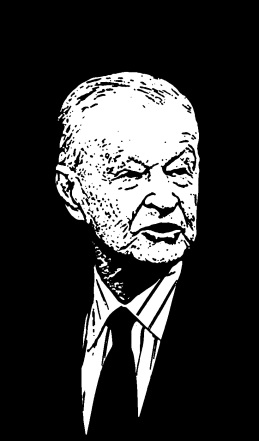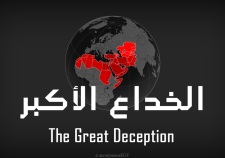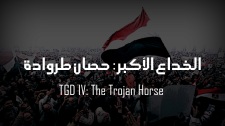Zbigniew Brzezinski: The man standing behind Obama & Osama!
 Zbigniew Brzezinski (born March 28, 1928 in Warsaw, Poland) is a Polish American political scientist, geostrategist, and statesman who served as United States National Security Advisor to President Jimmy Carter from 1977 to 1981.
Zbigniew Brzezinski (born March 28, 1928 in Warsaw, Poland) is a Polish American political scientist, geostrategist, and statesman who served as United States National Security Advisor to President Jimmy Carter from 1977 to 1981.
Major foreign policy events during his term of office included the normalization of relations with the People’s Republic of China (and the severing of ties with the Republic of China), the signing of the second Strategic Arms Limitation Treaty (SALT II), the brokering of the Camp David Accords, the transition of Iran from an important US client state to an anti-Western Islamic Republic, encouraging dissidents in Eastern Europe and emphasizing certain human rights in order to undermine the influence of the Soviet Union, the financing of the mujahideen in Afghanistan in response to the Soviet deployment of forces there (allegedly either to help deter a Russian invasion, or to deliberately increase the chance of such an intervention occurring—or for both contradictory reasons simultaneously being embraced by separate US officials) and the arming of these rebels to counter the Soviet invasion.
He was chosen by Barack Obama’s as top Foreign Policy Advisor on the Middle East, and is also a scholar at the Center for Strategic and International Studies, and a member of various boards and councils, including the International Crisis Group.
Early Life and Education
Brzezinski is the son of Leonia Roman and Tadvsz Brzezinski. He came to the United States in 1938 and was naturalized in 1958. He married Emilie Benes. He is an alumnus of McGill University of Canada (B.A., 1949) and Harvard University (M.A., 1950; Ph.D., 1953).
Career
From 1953 until 1960, Brzezinski was at Harvard University in the Russian Research Center and the Center for International Affairs. He served as an instructor and assistant professor of government, a research fellow, a research associate, and a consultant. From 1960 until 1966, he was on the faculty of Columbia University as an associate professor and professor of public law and government. While at Columbia, he was also the director of the University’s Research Institute on Communist Affairs and was a faculty member of the University’s Russian Institute.
In 1962, Brzezinski became a consultant to the Rand Corporation, a “think factory” which, since 1946, has held research contracts financed mainly by the U.S. Air Force, but also by the Atomic Energy Commission, the National Aeronautics and Space Administration, and the Defense Department. It was also in 1962 that Brzezinski became a consultant to the State Department and, in 1966, he relinquished his faculty position at Columbia to become a member of the State Department’s Policy Planning Council.
Brzezinski is currently the Robert E. Osgood Professor of American Foreign Policy at the School of Advanced International Studies, Johns Hopkins University, in Washington, D.C.
Working for the Carter and Bush Administrations
Brzezinski was a member of the Policy Planning Council of the Department of State from 1966 to 1968; chairman of the Humphrey Foreign Policy Task Force in the 1968 presidential campaign; director of the Trilateral Commission from 1973 to 1976; and principal foreign policy adviser to Jimmy Carter in the 1976 presidential campaign. From 1977 to 1981, Dr. Brzezinski was national security adviser to President Jimmy Carter. In 1981, he was awarded the Presidential Medal of Freedom for his role in the normalization of U.S.-China relations and for his contributions to the human rights and national security policies of the United States. He was also a member of the President’s Chemical Warfare Commission (1985), the National Security Council–Defense Department Commission on Integrated Long-Term Strategy (1987–1988), and the President’s Foreign Intelligence Advisory Board (1987–1989). In 1988, he was cochairman of the Bush National Security Advisory Task Force.
Afghanistan: Operation Cyclone

Zbigniew Brzezinski is seen here with a man thought now to be Osama bin Ladin on the Afghanistan border in the late 1980’s.
Brzezinski, known for his hardline policies on the Soviet Union, initiated in 1979 a campaign supporting mujaheddin in Pakistan and Afghanistan, which were run by Pakistani security services with financial support from the Central Intelligence Agency and Britain’s MI6. Part of the CIA program was led by their elite Special Activities Division and included the arming, training and leading of Afghanistan’s mujahideen. This policy had the explicit aim of promoting radical Islamist and anti-Communist forces to overthrow the secular communist People’s Democratic Party of Afghanistan government in Afghanistan, which had been destabilized by coup attempts against Hafizullah Amin, the power struggle within the Soviet-supported Parcham faction of the PDPA and a subsequent Soviet military intervention.
Years later, in a 1997 CNN/National Security Archive interview, Brzezinski detailed the strategy taken by the Carter administration against the Soviets in 1979:
We immediately launched a twofold process when we heard that the Soviets had entered Afghanistan. The first involved direct reactions and sanctions focused on the Soviet Union, and both the State Department and the National Security Council prepared long lists of sanctions to be adopted, of steps to be taken to increase the international costs to the Soviet Union of their actions. And the second course of action led to my going to Pakistan a month or so after the Soviet invasion of Afghanistan, for the purpose of coordinating with the Pakistanis a joint response, the purpose of which would be to make the Soviets bleed for as much and as long as is possible; and we engaged in that effort in a collaborative sense with the Saudis, the Egyptians, the British, the Chinese, and we started providing weapons to the Mujaheddin, from various sources again—for example, some Soviet arms from the Egyptians and the Chinese. We even got Soviet arms from the Czechoslovak communist government, since it was obviously susceptible to material incentives; and at some point we started buying arms for the Mujaheddin from the Soviet army in Afghanistan, because that army was increasingly corrupt.
Milt Bearden wrote in The Main Enemy that Brzezinski, in 1980, secured an agreement from King Khalid of Saudi Arabia to match US contributions to the Afghan effort dollar for dollar and that Bill Casey would keep that agreement going through the Reagan administration.
According to the “Progressive South Asia Exchange Net,” claiming to cite an article in Le Nouvel Observateur, U.S. policy, unbeknownst even to the Mujahideen, was part of a larger strategy of aiming “to induce a Soviet military intervention.” The article includes a brief interview with National Security Advisor Brzezinski, in which he is quoted as saying that the US provided aid to the mujahideen prior to the Soviet invasion for the deliberate purpose of provoking one. Brzezinski himself has denied the accuracy of the interview. According to Brzezinski, an NSC working group on Afghanistan wrote several reports on the deteriorating situation in 1979, but President Carter ignored them until the Soviet intervention destroyed his illusions. Brzezinski has stated that the US provided communications equipment and limited financial aid to the mujahideen prior to the “formal” invasion, but only in response to the Soviet deployment of forces to Afghanistan and the 1978 coup, and with the intention of preventing further Soviet encroachment in the region. Two declassified documents signed by Carter shortly before the invasion do authorize the provision “unilaterally or through third countries as appropriate support to the Afghan insurgents either in the form of cash or non-military supplies” and the “worldwide” distribution of “non-attributable propaganda” to “expose” the leftist Afghan government as “despotic and subservient to the Soviet Union” and to “publicize the efforts of the Afghan insurgents to regain their country’s sovereignty,” but the records also show that the provision of arms to the rebels did not begin until 1980.
According to Eric Alterman of The Nation, Cyrus Vance’s close aide Marshall Shulman “insists that the State Department worked hard to dissuade the Soviets from invading and would never have undertaken a program to encourage it” and President Carter has said it was definitely “not my intention” to inspire a Soviet invasion but to deter one.
Bob Gates, in his book Out Of The Shadows, wrote that Pakistan had actually been pressuring the United States for arms to aid the rebels for years, but that the Carter administration refused in the hope of finding a diplomatic solution to avoid war. Brzezinski seemed to have been in favor of the provision of arms to the rebels, while Vance’s State Department, seeking a peaceful settlement, publicly accused Brzezinski of seeking to “revive” the Cold War.
In an interview with The Christian Science Monitor, in March 1981, Jimmy Carter’s Vice-President Walter Mondale declared: “I cannot understand – it just baffles me – why the Soviets these last few years have behaved as they have. Maybe we have made some mistakes with them. Why did they have to build up all these arms? Why did they have to go into Afghanistan? Why can’t they relax just a little bit about Eastern Europe? Why do they try every door to see if it is locked?”
Brzezinski defended the arming of the rebels, saying that it “was quite important in hastening the end of the conflict,” but “not in deciding the conflict, because actually the fact is that even though we helped the mujaheddin, they would have continued fighting without our help… They just happen to have a curious complex: they don’t like foreigners with guns in their country. And they were going to fight the Soviets. Giving them weapons was a very important forward step in defeating the Soviets, and that’s all to the good as far as I’m concerned.” When he was asked if he thought it was the right decision in retrospect (given the Taliban’s subsequent rise to power), he said: “Which decision? For the Soviets to go in? The decision was the Soviets’, and they went in. The Afghans would have resisted anyway, and they were resisting. I just told you: in my view, the Afghans would have prevailed in the end anyway, ’cause they had access to money, they had access to weapons, and they had the will to fight.” The interviewer then asked: “So US support for the mujaheddin only begins after the Russians invade, not before?” Brzezinski replied: “With arms? Absolutely afterwards. No question about it. Show me some documents to the contrary.” Likewise; Charlie Wilson said: “The U.S. had nothing whatsoever to do with these people’s decision to fight … but we’ll be damned by history if we let them fight with stones.”
One of the CIA’s longest and most expensive covert operations was the supplying of billions of dollars in arms to the Afghan mujahideen militants. The CIA provided assistance to the fundamentalist insurgents through the Pakistani secret services, Inter-Services Intelligence (ISI), in a program called Operation Cyclone. Somewhere between $3–$20 billion in U.S. funds were funneled into the country to train and equip troops with weapons.[39][40] Together with similar programs by Saudi Arabia, Britain’s MI6 and SAS, Egypt, Iran, and the People’s Republic of China, The arms included Stinger missiles, shoulder-fired, antiaircraft weapons that they used against Soviet helicopters and that later were in circulation among terrorists who have fired such weapons at commercial airliners. Osama bin Laden was allegedly among the recipients of U.S. arms, although the US denies this and claims it did not support the “Afghan Arabs”. Pakistan’s secret service, Inter-Services Intelligence (ISI), was used as an intermediary for most of these activities to disguise the sources of support for the resistance.
With US and other funding, the ISI armed and trained over 100,000 insurgents. On July 20, 1987, the withdrawal of Soviet troops from the country was announced pursuant to the negotiations that led to the Geneva Accords of 1988, with the last Soviets leaving on February 15, 1989.
A 2002 study found that, in the wake of the Iranian Revolution, the United States had sought rapprochement with the Afghan government—a prospect that the USSR found unacceptable (especially as its own leverage over the regime was wearing thin). Thus, the Soviets intervened to preserve their influence in the country.
The early foundations of al-Qaida were built in part on relationships and weaponry that came from the billions of dollars in U.S. support for the Afghan mujahadin during the war to expel Soviet forces from that country. The initial bombing of the World Trade Center in 1993, the attacks on the U.S. embassies in Kenya and Tanzania, the attack on the USS Cole, and the attacks of September 11 were all allegedly linked to individuals and groups that at one time were armed and trained by the United States and/or its allies, although this view has been disputed
Commissions & councils
Trilateral Commission
Brzezinski was director of the Trilateral Commission from 1973 to 1976.
Center for Strategic & International Studies
Brzezinski serves as a Counselor and Trustee for the Center for Strategic & International Studies.
Council on Foreign Relations
In 2004, Brzezinski was co-chairman of a Council on Foreign Relations task force that issued the report “Iran: Time for a New Approach”.
International Crisis Group
Vice Chair, International Crisis Group
Published Works
- The Grand Chessboard: American Primacy and its Geostrategic Imperatives
- The Grand Failure: The Birth and Death of Communism in the 20th Century
- Out of Control: Global Turmoil on the Eve of the 20th Century
- Power and Principal: The Memoirs of the National Security Advisor
Affiliations
- Director, Council on Foreign Relations (CFR) (1972 to 1977)
- Vice Chair, International Crisis Group
- Former Director, Amnesty International
- Chairman, International Advisory Board for the Yale Project on The Future Culture & Civilization of China
- Trustee, Freedom HouseFormer Director, National Endowment for Democracy (Congressionally-funded organization)
- Trustee, Trilateral Commission; Director (1973-1976)
- Advisory Board, America Abroad Media
- Advisory Board, Partnership for a Secure America
- Chair, American Committee for Peace in Chechnya
- Honorary Chairman, AmeriCares Foundation (also used by CIA to finance Solidarity in Poland in the eighties)
- Honorary Council of Advisors, American Turkish Council
- Chairman, American-Ukranian Advisory Committee (organized by Brzezinski)
- Former Director, Atlantic Council
- Director, Jamestown Foundation
- Director, Polish-American Enterprise Fund, reputed CIA front
- Director, Polish-American Freedom Foundation, reputed CIA front
- Governor, Smith Richardson Foundation
- Advisory Board, US-Azerbaijan Chamber of Commerce
- Advisory Committee, AmeriCares (at least in 2004)
- International Advisory Board, Orange Circle
References:
- CIA assistance to Osama bin Laden
- Afghan training camp
- CIA activity in Afghanistan under William J. Casey 1981-1987
- CIA Activities by Region: Near East, North Africa, South and Southwest Asia
- Charles Wilson (Texas politician)
- Charlie Wilson’s War
- Soviet war in Afghanistan
Leave a comment Cancel reply
Latest
- وثيقة وكالة استخبارات الجيش الأمريكي في 2012: الولايات المتحدة و حلفائها سيتغاضون عن صعود الدولة الإسلامية من أجل عزل النظام السوري
- 2012 US Defense Intelligence Agency document: West will tolerate rise of Islamic State “in order to isolate the Syrian regime”
- Human Rights Watch: Rabaa sit-in dispersal a ‘crime against humanity’
- التقرير الكامل عن أحداث فض اعتصام رابعة العدوية
- The War on Roger Waters rages over comparing Israel to Nazis








This is a good article, but we need to keep in mind that Ziggy is only one puppet used by the elite (Rockefeller in this case) to recruit, name, train, finance and launch leaders (like Obama) and terrorists (like Osama). Sure, Ziggy did just that with Osama and Obama (no surprise there, just look at the names), but what about the others just like him, like Henry Kissinger; who gave us both of the Bush’s, the Clintons, and Mitt Romney? We must be very cautious as we look into the affairs of these criminals, because once you make it this far and find obscure and difficult to locate articles like the one you have just read above, you have now become an investigator. You are no longer a student, a curious observer, or a “conspiracy” theorist. You are far more important than the very FBI, which stands for F’n Braindead Idiots; an agency whose sole purpose is covering the tracks of these criminals and their actions. Now, start looking into who recruited, groomed, named, trained, and supported Ziggy and Henry. You will find it was a Wall Street tycoon named Bernard Baruch, who will lead you right back to David Rockefeller Sr. Historically, only one Rockefeller ever made it to the White House, however the fact is nobody ever sets foot into the White House unless the Rockefeller family had one of their recruiters put him there. In the 2012 election we have one of Ziggy’s boys being challenged by one of Henry’s boys, and while Ziggy’s boy is dismantling the United States and sending all our wealth to places like Dubia, Hong Kong and Saudi Arabia, Henry’s boy will most certainly launch the nukes against Iran. The game here is what do Americans want, a destitute country with UN troops patrolling the streets or a nuclear war. Either way, the two choices were put upon us by the dearest of friends, two recruits of Bernard Baruch: Henry Kissinger and Zbigniew Brzezinski. Those are the real terrorists and evil doers. You all knew this already, right?
That is not a picture of Brzezinski with Osama “bib” Laden. Probably the “Lion of Panjshir” himself: Shah Ahmad Massoud,